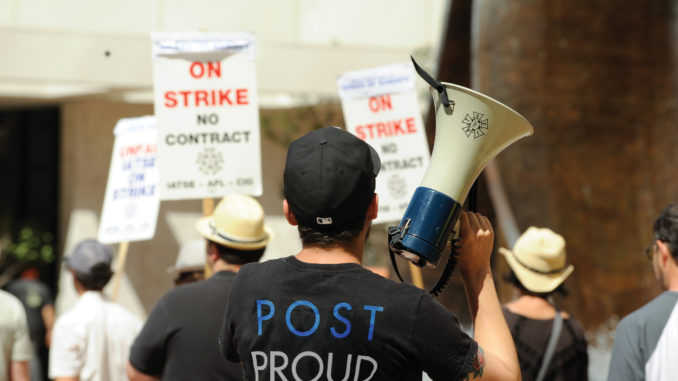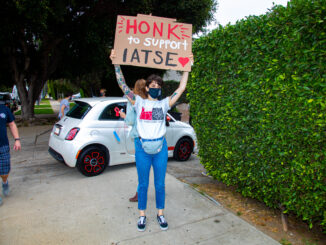
By Tris Carpenter

If you’ve been reading this column for a while, you know that the National Labor Relations Board (NLRB) sets much of the policy for union organizing in this country. In a disturbing development this summer, the NLRB voted 3-2 to review the legality of “card check,” a system by which employees can gain union representation without going through a lengthy and treacherous election process.
What is card check, you ask? In virtually every organizing drive, we ask employees to sign authorization cards, which give the union the authority to be their representative for collective bargaining. When we receive signed cards from a majority of the employees, we notify the employer that we now have a majority status and want to negotiate a contract. In order to speed up the process (read: avoid an NLRB supervised election which can take from six to eight weeks to run––more if either side files objections in court) we try to get the employer to agree to a card check, whereby a neutral third party such as an arbitrator will inspect (check) the cards and verify the authenticity of the signatures. In these agreements, the company also agrees to negotiate with the union should we sufficiently demonstrate our majority status.
Prior to an organizing campaign, some unions will try to get a “card check/neutrality” agreement from an employer, which not only obligates the employer to the card check process, but also requires that the employer take a neutral stance and not actively campaign against the union trying to get signatures. Often, these agreements are obtained after extensive corporate campaigns to persuade stockholders and corporate directors to step aside for the union effort.
Since its inception in the late 1930s, card check has consistently been ruled legal by the NLRB. For that reason alone, the Board’s recent decision to review this matter (a vote where the three Republicans favored the review and the two Democrats opposed) is disturbing and yet another in a series of attacks upon organized labor by the Bush Administration and the Republican Party.
By striking for recognition and a contract, the IATSE is using the process that existed long before the LMRA or its predecessor, the National Labor Relations Act.
The National Right to Work Legal Defense Foundation (NRTWLDF) filed this complaint against card checks with the NLRB. They have also asked their flunkies in Congress to file legislation that would amend the law and prohibit card check forever. The goal of both the complaint and the pending legislation is the same: to make it harder to organize by mandating NLRB supervised elections as the only path to union representation. The NRTWLDF claims that NLRB elections are the only “democratic” way for workers to make this decision and that card check agreements are signed by companies under economic pressure to and thereby not really a “free” choice.
Please indulge an abbreviated rant here: The NLRB-supervised election is about the most un-democratic process I have ever seen. In virtually every organizing campaign I have run, the employer has attempted to threaten, bribe, badger or intimidate employees into voting against the Guild. The legal sanctions for such actions are weak (and the employers and their attorneys know this), and violations of the law routinely occur. In virtually every instance, the union has more support when it files a petition for an election with the NLRB than it has when the election actually takes place, in spite of the obvious benefits to working union.
Okay, back to the legal analysis. Given the vote to review (and the prevailing Republican majority on the board), it is likely that some decision will have been reached by the November election––and by the time you read this. Some experts believe that card check/neutrality is probably the most vulnerable since these are the agreements most often attained after extended pressure on stockholders and company directors. Card check agreements without neutrality clauses are probably vulnerable as well.
What does this mean to the IATSE and the Editors Guild? Well, although we often ask for card check agreements in our organizing campaigns where we get a majority of cards, very few companies have agreed to it. The lion’s share of our organizing goes down one of two paths: NLRB election or strike for recognition and contract (in which the crew––usually production but often with the participation of post––walks off the job until an agreement is reached between the IA and the producer). Obviously, the NLRB election process will still be available. But what about the strike?
The NLRB-supervised election is about the most un-democratic process I have ever seen. In virtually every organizing campaign I have run, the employer has attempted to threaten, bribe, badger or intimidate employees into voting against the Guild.
The Labor Management Relations Act (LMRA), the law that the NLRB administers, specifically preserves the right to strike for recognition and a contract, as well as to attempt to gain concessions. In fact, by striking for recognition and a contract, the IATSE is using the process that existed long before the LMRA or its predecessor, the National Labor Relations Act (a much more union-friendly law passed during President Franklin D. Roosevelt’s New Deal that was weakened by the Republicans through the Taft-Hartley Amendment, which incidentally, was passed over President Harry Truman’s veto).
The upshot is that union organizers from the IA and its constituent locals such as the Editors Guild will need to develop ways to step very carefully around whatever decision is made by the NLRB to avoid having their contracts swept away by a technicality. We’ll probably continue to ask that people sign authorization cards as a show of support, we just won’t be able to short circuit the NLRB election process, which favors the employer. When a crew is unable or unwilling to strike for recognition and a contract, the going is likely to get tougher and take longer because of the Republican Party’s view of the “democratic” process.





